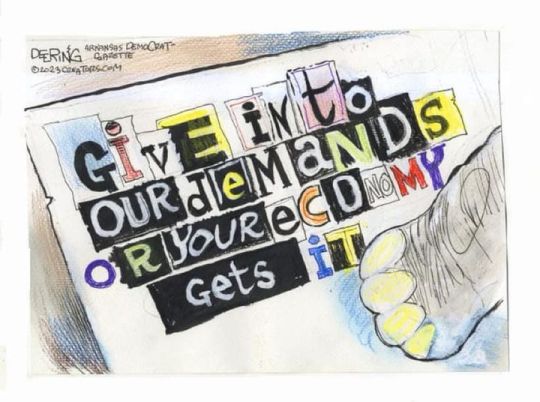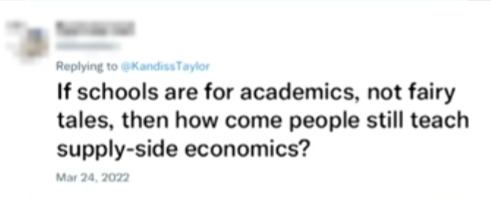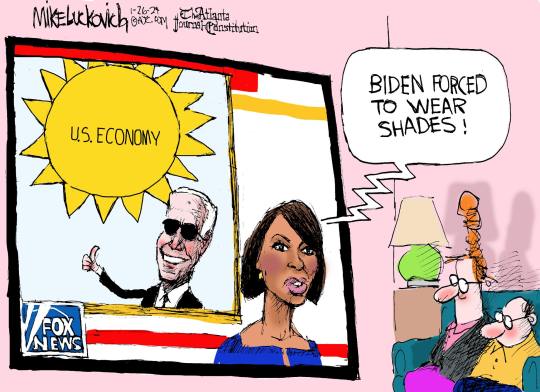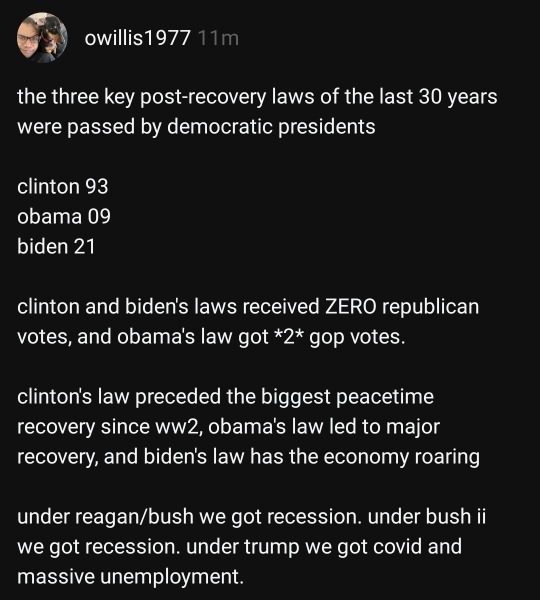#supply-side economics
Text
This is long, but it's such a good, clear explanation of current issues! Highly recommended.
#economy#taxes#economic policy#supply-side economics#abortion#border control#Republicans#GOP#2024 election#Heather Cox Richardson
2 notes
·
View notes
Text
Angie/Maddie🦇❥🇺🇸
'
Link shared by @canisterribilis
#Supply-Side Economics#Arthur Laffer#Hillsdale College Online#Ronald Reagan#Donald Trump#POTUS40#POTUS45#MAGA#America First
2 notes
·
View notes
Text

How does Larry Kudlow have a job? His punditry is always 100% wrong.
It's because [white male] conservatives can say anthing they want on FOX. There is no consequence because the viewers don't keep score.
Liz Truss' economic plan crushed the British economy. She resigned in 45 days.
No one at FOX will say. 'Gee, Larry, you were wrong. Your plan would be a disaster for America'.
294 notes
·
View notes
Text
Watch "Jon Stewart Explains Trickle Down" on YouTube
youtube
John Stewart explains Supply Supply Economics in under two minutes.
8 notes
·
View notes
Text

LETTERS FROM AN AMERICAN
February 1, 2024
HEATHER COX RICHARDSON
FEB 2, 2024
One of the biggest stories of 2023 is that the U.S. economy grew faster than any other economy in the Group of 7 nations, made up of democratic countries with the world’s largest advanced economies. By a lot. The International Monetary Fund yesterday reported that the U.S. gross domestic product—the way countries estimate their productivity—grew by 2.5%, significantly higher than the GDP of the next country on the list: Japan, at 1.9%.
IMF economists predict U.S. growth next year of 2.1%, again, higher than all the other G7 countries. The Federal Reserve Bank of Atlanta projects growth of 4.2% in the first quarter of 2024.
Every time I write about the booming economy, people accurately point out that these numbers don’t necessarily reflect the experiences of everyone. But they have enormous political implications.
President Joe Biden, Vice President Kamala Harris, Secretary of the Treasury Janet Yellen, and the Democrats embraced the idea that using the government to support ordinary Americans—those on the “demand” side of the economy—would nurture strong economic growth. Republicans have insisted since the 1980s that the way to expand the economy is the opposite: to invest in the “supply side,” investors who use their capital to build businesses.
In the first two years of the Biden-Harris administration, while the Democrats had control of the House and Senate, they passed a range of laws to boost American manufacturing, rebuild infrastructure, protect consumers, and so on. They did so almost entirely with Democratic votes, as Republicans insisted that such investments would destroy growth, in part through inflation.
Now that the laws are beginning to take effect, their results have proved that demand-side economic policies like those in place between 1933 and 1981, when President Ronald Reagan ushered in supply-side economics, work. Even inflation, which ran high, appears to have been driven by supply chain issues, as the administration said, and by “greedflation,” in which corporations raised prices far beyond cost increases, padding payouts for their shareholders.
The demonstration that the Democrats’ policies work has put Republicans in an awkward spot. Projects funded by the Infrastructure Investment and Jobs Act, also known as the Bipartisan Infrastructure Law, are so popular that Republicans are claiming credit for new projects or, as Representative Maria Elvira Salazar (R-FL) did on Sunday, claiming they don’t remember how they voted on the infrastructure measure and other popular bills like the CHIPS and Science Act (she voted no). When the infrastructure measure passed in 2021, just 13 House Republicans supported it.
Today, Medicare sent its initial offers to the drug companies that manufacture the first ten drugs for which the government will negotiate prices under the Inflation Reduction Act, another hugely popular measure that passed without Republican votes. The Republicans have called for repealing this act, but their stance against what they have insisted is “socialized medicine” is showing signs of softening. In Politico yesterday, Megan Messerly noted that in three Republican-dominated states—Alabama, Georgia, and Mississippi—House speakers are saying they are now open to the idea of expanding healthcare through Medicaid expansion.
In another sign that some Republicans recognize that the Democrats’ economic policies are popular, the House last night passed bipartisan tax legislation that expanded the Child Tax Credit, which had expired last year after Senate Republicans refused to extend it. Democrats still provided most of the yea votes—188 to 169—and Republicans most of the nays—47 to 23—but, together with a tax cut for businesses in the bill, the measure was a rare bipartisan victory. If it passes the Senate, it is expected to lift at least half a million children out of poverty and help about 5 million more.
But Republicans have a personnel problem as well as a policy problem. Since the 1980s, party leaders have maintained that the federal government needs to be slashed, and their determination to just say no has elevated lawmakers whose skill set features obstruction rather than the negotiation required to pass bills. Their goal is to stay in power to stop legislation from passing.
Yesterday, for example, Senator Chuck Grassley (R-IA), who sits on the Senate Finance Committee and used to chair it, told a reporter not to have too much faith that the child tax credit measure would pass the Senate, where Republicans can kill it with the filibuster. “Passing a tax bill that makes the president look good…means he could be reelected, and then we won’t extend the 2017 tax cuts,” Grassley said.
At the same time, the rise of right-wing media, which rewards extremism, has upended the relationship between lawmakers and voters. In CNN yesterday, Oliver Darcy explained that “the incentive structure in conservative politics has gone awry. The irresponsible and dishonest stars of the right-wing media kingdom are motivated by vastly different goals than those who are actually trying to advance conservative causes, get Republicans elected, and then ultimately govern in office.”
Right-wing influencers want views and shares, which translate to more money and power, Darcy wrote. So they spread “increasingly outlandish, attention-grabbing junk,” and more established outlets tag along out of fear they will lose their audience. But those influencers and media hosts don’t have to govern, and the anger they generate in the base makes it hard for anyone else to, either.
This dynamic has shown up dramatically in the House Republicans’ refusal to consider a proposed border measure on which a bipartisan group of senators had worked for four months because Trump and his extremist base turned against the idea—one that Republicans initially demanded.
Since they took control of the House in 2023, House Republicans have been able to conduct almost no business as the extremists are essentially refusing to govern unless all their demands are met. Rather than lawmaking, they are passing extremist bills to signal to their base, holding hearings to push their talking points, and trying to find excuses to impeach the president and Secretary of Homeland Security Alejandro Mayorkas.
Yesterday the editorial board of the Wall Street Journal, which is firmly on the right, warned House Republicans that “Impeaching Mayorkas Achieves Nothing” other than “political symbolism,” and urged them to work to get a border bill passed. “Grandstanding is easier than governing, and Republicans have to decide whether to accomplish anything other than impeaching Democrats,” it said.
Today in the Washington Post, Jennifer Rubin called the Republicans’ behavior “nihilism and performative politics.”
On CNN this morning, Representative Dan Goldman (D-NY) identified the increasing isolation of the MAGA Republicans from a democratic government. “Here we are both on immigration and now on this tax bill where President Biden and a bipartisan group of Congress are trying to actually solve problems for the American people,” Goldman said, “and Chuck Grassley, Donald Trump, Mike Johnson—they are trying to kill solutions just for political gain."
LETTERS FROM AN AMERICAN
HEATHER COX RICHARDSON
#economic news#economic policy#Letters From An American#Heather Cox Richardson#history#WAPO#Wall Street Journal#supply side economics#the demand side#greedflation#extremist Republicans
5 notes
·
View notes
Text
Financially Good Omens: The Nice and Accurate Prophecies of Agnes Nutter, Voodoo Economist
A new adaptation of Good Omens, except all the predictions are about Reaganomics. Also, the devil wins in the end.
#bad idea#movie pitch#pitch and moan#good omens#terry pratchett#neil gaiman#prediction#reaganomics#voodoo economics#supply side economics#finace#economics#horror#fantasy#comedy#adaptation
16 notes
·
View notes
Text

"To which I say . . . roasted." - John Oliver
#last week tonight#john maynard keynes got a lot right#supply side economics was not one of them#john oliver
3 notes
·
View notes
Link
#taxes#arizona#az#2011#anti-taxes#supply side economics#privatization#social justice#social welfare#precariot#poverty#tea party
0 notes
Text
Milton Friedman falls out with Thatcher
Milton Friedman falls out with Thatcher
The first Thatcher government of 1979 to 1983 embraced an economic theory called monetarism. The leading proponent was Professor Milton Friedman and it became popular with economists in the 1970s. Basically, monetarists argued that the amount of money in the economy determines economic performance. They blamed an increase in the supply of money for the high inflation and poor economic performance…

View On WordPress
#70s#80s#economic depression#Karl Marx#keith joseph#margaret thatcher#Milton Friedman#monetarism#supply side economics#Thatcher#UK recession
0 notes
Text
If you have time for one long read this holiday weekend, make it this one.
#Heather Cox Richardson#economy#economic policy#Bush tax cuts#trump tax cuts#supply-side economics#demand-side economics#social safety net#market forces#Social Security and Medicare
1 note
·
View note
Photo



Dude really played a big part of why things are as bad as they are currently.
(via Ronald Regan is the Devil - OBEY style Graphic T-Shirt by KBwiththeTees)
#fuckronaldregan#fuck reagan#ReaganSucked#ContraScandal#supply side economics#voodoo economics#grenada#aids epidemic#zero tolerance#just say no
1 note
·
View note
Text
The supply siders abroad.

October 6, 2022
The conservative right mainly survives by persuading people to believe egregious lies. Immigrants bring crime. Guns will keep you safe. America is a Christian nation. Global warming is a hoax. Even when debunked again and again, they just keep repeating the falsehoods over and over. And one of the most persistent of these is the supply side scam.
That's the one that says cutting taxes for corporations and the morbidly wealthy magically creates jobs, stimulates investment and brings economic growth, all without increasing the government's budget deficit. It's what the elder (and smarter) George Bush called "voodoo economics."
You might remember it from such failures as the Reagan, Bush Jr. and Trump tax cuts. Each of which massively inflated the federal deficit and economic inequality. But none of which did much for the economy. Now this zombie theory has migrated across the pond.
Newly installed British Prime Minister Liz Truss (pictured above engaging in a serious policy debate) and Chancellor of the Exchequer Kwasi Kwarteng recently put forward a massive £45 billion tax-cutting package that entirely eliminates the top tier of income tax. Kwarteng said it would usher in a "new era." If by that he meant an era of a ruinously weakened pound, skyrocketing mortgage rates and general economic chaos, he was right on. It was, of course, merely the British version of the same, old supply side hustle. Only this time, the markets and the voting public weren't falling for it.
Even economists know better now. In a study published in 2020 by the London School of Economics, researchers looked at 18 wealthy OECD countries over five decades and unambiguously concluded,
We find that major reforms reducing taxes on the rich lead to higher income inequality as measured by the top 1% share of pre-tax national income. In contrast, such reforms do not have any significant effect on economic growth and unemployment.
Meanwhile, a new poll by YouGov showed Truss's Conservative Party trailing Labour by a whopping 33 points as a result of the tax scheme. Which is why earlier this week — and just hours after she had defiantly defended her radical economic agenda — Kwarteng announced the government was scrapping the whole plan. Said he, "We get it and we have listened."
In the 40 years since Reagan convinced us cutting taxes for the rich was good policy, the main effect has been a wealth transfer of $50 trillion from America’s working class to its oligarchs. Fortunately, the Brits discovered in time that the supply side swindle is a lie and always has been.
0 notes
Text
Zombie Myths: The Economic Lies that Just Won't Die | Robert Reich
youtube
#robert reich#zombie#zombie economics#supply side economics#trickle down economics#economic inequality#Youtube
1 note
·
View note
Text

Mike Luckovich
* * * *
LETTERS FROM AN AMERICAN
April 5, 2024
HEATHER COX RICHARDSON
APR 06, 2024
Today offered yet more evidence that Biden’s rejection of the Republicans’ supply-side economics in favor of investing in ordinary Americans is paying off with high growth, low unemployment, and strong wages.
Today’s jobs report from the U.S. Department of Labor for the month of March showed higher job growth than analysts anticipated. Instead of the 214,000 jobs expected, the U.S. added 303,000. The government also revised its estimate of job growth in January and February upward by a combined number of 22,000. President Joe Biden noted that this report meant that the administration had created more than 15 million jobs since he took office.
The unemployment rate was also good, dropping slightly to 3.8% in March. According to economist Steven Rattner of Morning Joe, the United States has now had 26 consecutive months—more than two years—of unemployment under 4%, the longest stretch of unemployment that low since the late 1960s.
Rattner pointed out that immigrants have helped to push U.S. growth since the pandemic by adding millions of new workers to the labor market. As native-born workers have aged into retirement, immigrants have taken their places and “been essential to America’s post-COVID labor market recovery.”
Heather Long of the Washington Post added that wage growth has been 4.1% in the past year, which is well above the 3.2% inflation rate.
“My plan is growing the economy from the middle out and the bottom up, investing in all Americans, and giving the middle class a fair shot,” Biden said in response to the new jobs report. That system, which resurrects the economy the United States enjoyed between 1933 and 1981, has been a roaring success.
Biden was in Baltimore, Maryland, today, where he flew over the remains of the collapsed Francis Scott Key Bridge, spoke with the response teams there, and met with the families of those who died when the bridge fell. Apparently trying to demonstrate that government can be both efficient and effective, the administration has emphasized speed and competence in its response to the bridge collapse of March 26, 2024.
Kayla Tausche of CNN reported today that the U.S. Coast Guard was onsite within minutes of the collapse, and that Transportation Secretary Pete Buttigieg was working the phone as soon as he heard. He had spoken with Maryland governor Wes Moore, Baltimore mayor Brandon Scott, and White House chief of staff Jeff Zients by 5:00 a.m. Biden was briefed early that morning, before he began to reach out to state and local leaders.
Baltimore County executive Johnny Olszewski told Tausche: “[Biden] demonstrated a clear understanding of the importance of the port, had a real empathy for myself and all the individuals impacted…. And he was unequivocal that he was going to do whatever he can, legally and within his power to expedite a response.”
The collapse of the bridge not only affected traffic around Baltimore, but also shut the Port of Baltimore. For 13 years, that port has led the nation in carrying cars and light trucks, as well as tractors and cranes, handling more than 847,000 vehicles in 2023. In that same year, the port handled more than 444,000 passengers and $80 billion worth of foreign cargo. The damage to the port is of national significance.
Less than four hours after it received an official request for funding for repairs on March 29, the Department of Transportation authorized funds to begin to address immediate needs, which officials say is a record. The Army Corps of Engineers says it expects to restore a narrow navigation channel for use by the end of April and to have the port reopened fully by the end of May. Until then, the federal government is improving the infrastructure at nearby Sparrows Point to enable it to handle more ships.
But the Republican Party remains committed to the idea that the government must be kept small and that private enterprise must be privileged over public investments. Today, the far-right House Freedom Caucus announced that it would not consider funding the bridge repairs until foreign shipping companies had paid in all they owe (Biden has called for funding the bridge immediately rather than waiting for insurance funds, which will come much later).
They also say that they want the repairs to come out of money Congress has appropriated for other initiatives they dislike, that any new funds must be fully offset by other cuts, and that “burdensome regulations” such as labor agreements must be waived “to avoid all unnecessary delays and costs.”
They are also demanding that Biden reverse the administration’s “pause on approvals of liquified natural gas export terminals” before Congress will consider any funding for the bridge reconstruction. In January, under pressure from climate activists, Biden paused the construction of such terminals. Liquid natural gas is a valuable export, but it is also made up primarily of methane, a greenhouse gas significantly worse for the planet than carbon dioxide. Oil and gas interests are strongly in favor of developing the liquid natural gas industry while ignoring its effects on climate change.
One of the proposed plants affected by the pause would have been the largest in the U.S. It is planned for Louisiana, the home state of House speaker Mike Johnson. Johnson has already tried to tie funding for Ukraine to lifting the pause on liquid natural gas export terminals, and the White House refused. Now, apparently, extremist Republicans are trying the same gambit with repairs to the Francis Scott Key Bridge and access to one of the nation’s most important ports, although slowing repairs at that key juncture will directly affect many of their constituents.
Indeed, despite the solid demonstration that government support for ordinary Americans is the best way to build the economy, Republicans continue to maintain that the way to promote economic growth is to concentrate money among a few men at the top of the economic ladder. The idea is that those few people will invest their money more efficiently than the government can, and that the businesses they create will employ more and more workers. To that end, Republicans since 1981 have focused on tax cuts and deregulation in order to give those they see as job creators a free hand.
That system, so-called “supply-side economics,” has never actually worked, but it has become an article of faith for Republicans. It is a system that is popular with the very wealthy, and Biden called that out today in a video he recorded with Senator Bernie Sanders (I-VT).
In the video, the two men comment on a video clip in which former president Trump, speaking at a private event, promises wealthy donors another tax cut. Biden says: “That’s everything you need to know about Donald Trump. When he thinks the cameras aren’t on, he tells his rich friends, ‘We’re gonna give you tax cuts.’”
Sanders chimes in: “Can anybody in America imagine that at a time of massive income and wealth inequality—billionaires are doing phenomenally well—that he’s going to give them huge tax breaks? And then at the same time, he’s going to cut Social Security, Medicare, and programs that our kids need….”
“That makes me mad as hell, quite frankly,” Biden says. “There are 1,000 billionaires in…this country. They pay an average of 8.2% [in] federal taxes. So…we have a plan: Asking his good buddies to begin to pay their fair share.”
LETTERS FROM AN AMERICAN
HEATHER COX RICHARDSON
#Heather Cox Richardson#Letters From An American#Biden Economy#supply side economics#trickle down economics#failed Republican ideas#income inequality
3 notes
·
View notes
Text


Government stimulus works.
Democratic policies work.
Republican supply side economics, their tax cuts, and their trickle down are all MASASIVE FAILURES. We have the proof.
Never forget, all the Democratic recovery plans and policies had zero Republican support and they all saved America. Not only that, Republicans predicted the recovery plans would not work.
Three strikes! Republicans caused the economic crisis, Republicans predicted the stimulus would not work, then they voted against the stimulus.
714 notes
·
View notes
Text
LeftTards use “Capitalism” the same way grade schoolers use “Gay”
“I don’t like this so CAPITALISM!”
Capitalism can be defined in three words: The market decides.
We don’t have capitalism. The Reaganites murdered it off back in the 1980s. We have “Supply side” or “Trickle down” which is the opposite of capitalism. It’s antithetical. And before we heap all the blame on the Republicans: Obama out Reaganed Ronald Reagan!
Google it, for Christ’s sake...
“Capitalism” is market economics and “Capitalism” REQUIRES sound government regulations.
Think of a farmer’s field. Okay? Plants know how to grow. Leave nature be and an empty field will become overgrown with plants. Left on it’s own it’ll become a forest. Nature needs no help to grow plants.
But we do. If we want to maximize that field, if we want to get food from that field and not weeds... if we want to harvest crops from that field instead of seeing them devoured by insects and other pests... if we want to see those plants flourish instead of dry up & die... we have to regulate that field. We have to stop weeds and other intrusive plants from growing. We have to keep vermin from chewing it all up. We have to water it when the rains fail.
Get it? Nature needs no help to grow plants, but we do. And the same it true for the economy.
Economies exist. They always exist. We don’t need government, we don’t need laws. Trade has existed into cavemen times and it will always exist. It’s if we want to maximize the benefit of the economy, the market. If we want it to remain fair. If we want to be able to hold people accountable for abusing the market THEN we need regulations. We need government.
Capitalism, the free market will stop being free without regulation, just as sure as the farmer’s field will be overrun with weeds & saplings if he fails to regulate it.
We don’t have capitalism. We have the 1%, the corporations, the billionaires and even the millionaires dictating TO THE MARKET, not the other way around.
Our problem is the lack of capitalism. Our solution is the restoration of capitalism.
#Capitalism#market economics#free trade#fair trade#regulation#money#jobs#tax codes#taxes#trickle down#supply side
1 note
·
View note